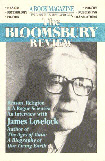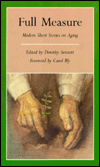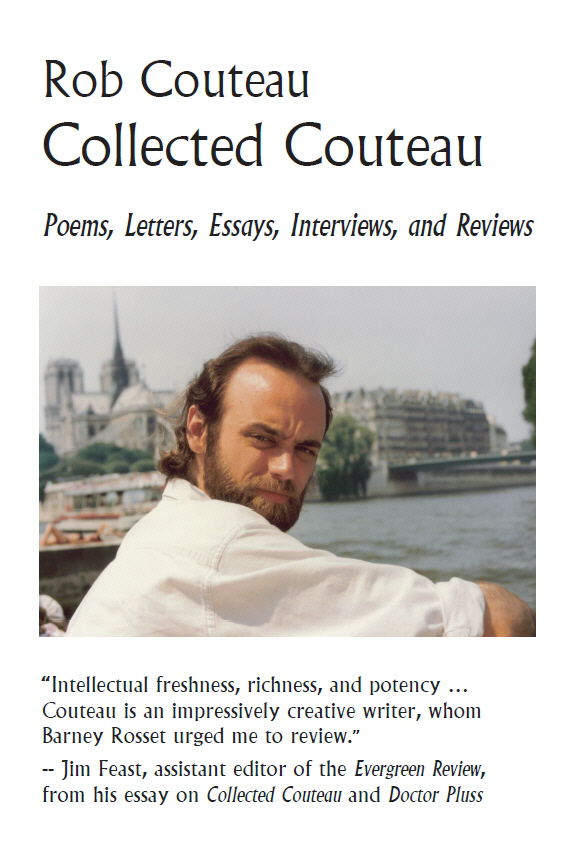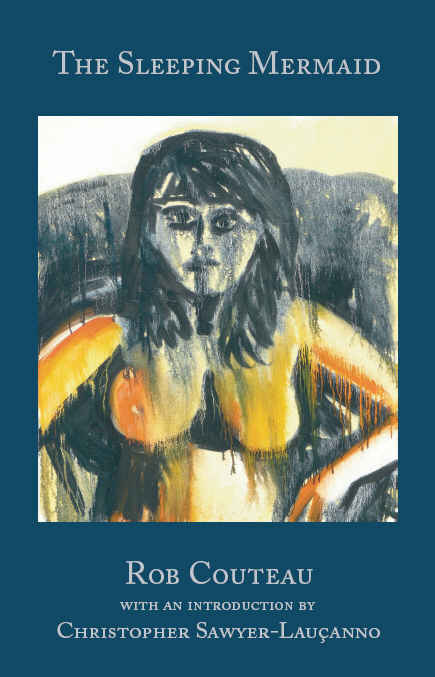|
Full Measure. Modern Short Stories on Aging, ed. Dorothy Sennett. (Saint Paul, MN: Graywolf Press, 1988.) Book review by Rob Couteau
|
Published in: The Bloomsbury Review, March / April 1989 (CO: Denver) |
|
|
||
|
Old age is often thought of as an appropriate period in life to reminisce: to boil down experience into the quintessence of one's "story." Although everyone's adventure is unique, common images emerge when contemplating mortality. In Full Measure, Dorothy Sennett has collected the work of twenty-three authors, most of them well known, who have attempted to portray an essential aspect of this theme. A few of the pieces are noteworthy for their innovative plotting. In "The Dust of Yuri Serafimovitch," James Fetler explores the notion of self and soil. Yuri, an old Russian seaman and veterinarian, is offered shelter by the proprietor of a bookstore who refuses to purchase his unsalable old texts but who feels compelled to help him apply for naturalization, so he can qualify for a pension. Although the pension is Yuri's only logical option, he avoids studying for his naturalization test. Instead, he prefers to recall his adventures on the seas or to display his outdated knowledge of veterinary science. For him, reminiscence has become an obstacle to transformation: divorcing him from the present and, therefore, inviting disaster. He even stubbornly clings to a tin box that contains dirt from his native city of Murmansk. Although it's through no effort of his own that Yuri obtains his papers, something about his sincerity convinces the government official to allow him to pass. As if acknowledging this destined transformation, Yuri goes to the zoo, "scattering the dust to the beasts … Dust to the elephants, dust to the imprisoned cats. Like a planter the old man was sowing his dust." As if dismantling a tomb, or scattering his own ashes, he pays homage to his past while accepting the challenge of the present. In Joyce Carol Oates's "A Theory of Knowledge," the protagonist, Professor Weber, is secluded in a Gothic setting in the "foothills of the Chautauqua Mountains," with "freedom at last to compose his book on the foundations of human knowledge-freedom to sit in the sun for hours, brooding, dozing." Oates's skillful portrayal of the intricate cerebrations of this crank nineteenth-century philosopher is an unexpected treat: "Nominalism would not triumph. The sleazy sordid Sophistic relativism of the Republic would not triumph over him … And it did not." His metaphysical contemplations are interlaced with biographical details, observations about the weather, conversations with his daughter (who looks after him), and sounds of the surrounding countryside. Unable to articulate a unified philosophical system ("purify your thoughts … draw your ideas together before it is too late"), he is distracted by the occasional appearance of a strange-looking young boy. Weber's daughter and the other locals ignore the obvious neglect and physical abuse of the boy by his parents, but when Weber hears his screams and discovers his plight, he comes to the rescue. Although no one else is willing to "hear" the boy, Weber, feeling himself to be a victim of the philosophical deafness of others, whispers: "I hear you, I hear you" as he slowly shuffles through the moonlight to the child. As his philosophy is called into action, his normally distracted state of mind is suddenly transformed:
After he rescues him, the verbose professor simply remarks: "No need to speak! You're safe with me!" Emerging from his own entrapment by putting aside his detached, intellectual approach, Weber shares a rebirth with the boy: "They laughed quietly together, so that no one else could hear." One of the most unusual characters in this collection is Conrad Aiken's "Mr. Arcularis," who, "in spite of … his own dreadful certainty that he was going to die," miraculously leaves a hospital and embarks upon a pleasure cruise. Oddly enough there's a corpse on board: perhaps, he wonders, a portent of disaster. As the great voyage is underway, Mr. Arcularis recognizes certain fixed rhythms: "people passing and repassing in their restless round of the ship." He notes "a kind of tyranny in this fixedness" and wonders at the "terrifying fixed curve of the infinite" and the "bright flash of death." He dreams of traveling through space: toward a faraway star. Finally, he befriends a fellow passenger, a Miss Dean, and he relates his dream. A sympathy develops between them: one that blossoms into powerful empathy and understanding. As their feelings deepen, so too does his sense of horror. For he continues to dream of "going round a star, the same terrible coldness and helplessness. That awful whistling curve …" When they realize every dream is followed by his awakening in the vicinity of the coffin, they experience a sense of terror. Although they realize he is moving toward his death, their fear is eventually eclipsed by mutual love. Thus, when Mr. Arcularis enters his final dreaming, he is reconciled, and he experiences "not coffers, but light, delight, supreme white and brightness, whirling lightness above all-freezing-freezing-freezing …" Aiken's ability to render a unique tale and to create this lucid romantic setting gives the work a special feel, as does its ending: "At this point in the void the surgeon's last effort to save Mr. Arcularis's life had failed." Rather than the reader feeling deceived, this shift in perspective deepens the implications of story. One of the most powerful works in this collection is Raymond Carver's "After the Denim." As with many of Carver's stories, what sustains the reader's interest is his portrayal of ordinary people (with all their complexity and power of emotion) rather than the resolution of a superficial conflict introduced early on to maintain suspense. Carver's artistry is itself suspenseful: stunning in its precision, and painful to absorb as the emotional core of the tale is brought into focus. Often, he draws his characters along a line that culminates in a not-so-happy place. Here, an elderly man (whose wife is seriously ill) bitterly condemns youth for its carefree attitude; its unconsciousness of sickness, suffering, and death; its blindness to all that follows "after the denim and the earrings, after touching each other and cheating at games." + There are other works of merit in Full Measure, among them Bernard Malamud's "In Retirement," Stanley Ellin's "The Blessington Method," and V. S. Pritchett's "Tea with Mrs. Bittell." My only criticism concerns not the overall quality of the selections but the narrow cultural range they represent. For instance, only one story, by Arthenia J. Bates, contains African-American characters: a mere seven out of 399 pages. In her preface, editor Dorothy Sennett writes: "Selecting these stories and coming to terms with the necessary omissions … have been less perilous tasks than one might suppose." That it was not experienced as perilous is unfortunate. A broader cultural sensitivity would have resulted in avoiding such perils of ethnic exclusion and encouraged a greater variety of artistry. |
||
|
This essay is featured in:
|
||
Updated: 23 August 2011 | All text Copyright © 2011 | Rob Couteau | key words: Full Measure Modern Short Stories on Aging Dorothy Sennett stories about aging old age men women literature book reviews of novels and literary works by Rob Couteau expatriate writers in Paris |




